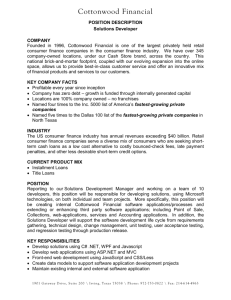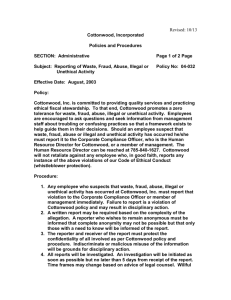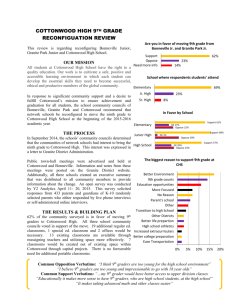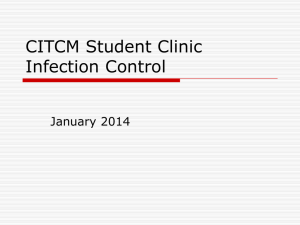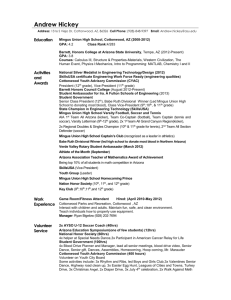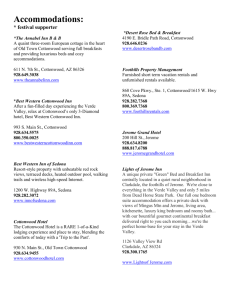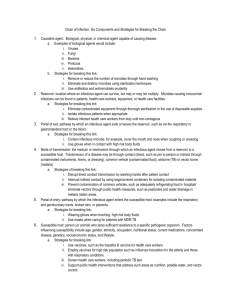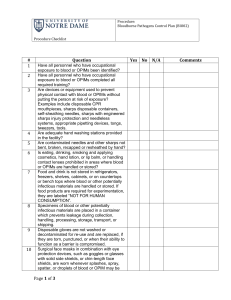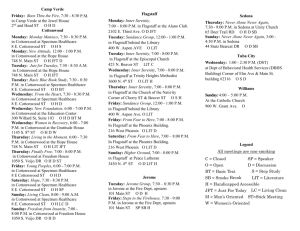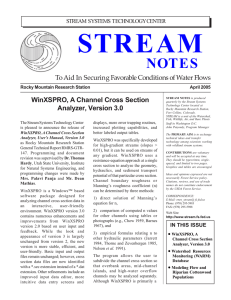Policy 03-041 - Intranet - Cottonwood Incorporated
advertisement
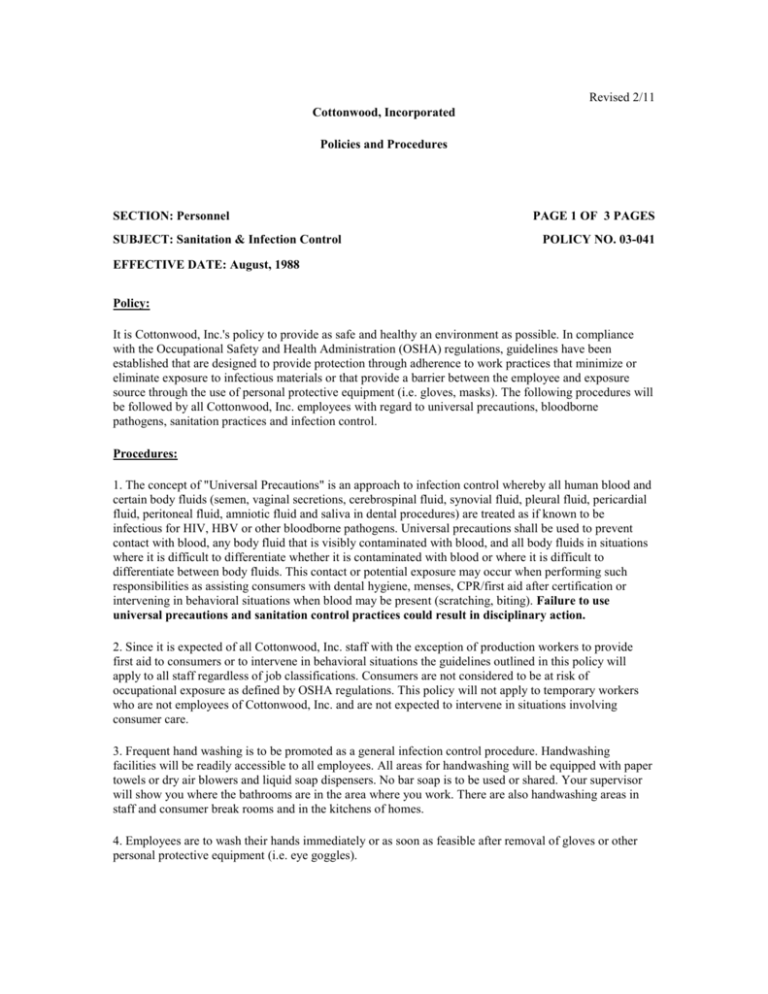
Revised 2/11 Cottonwood, Incorporated Policies and Procedures SECTION: Personnel SUBJECT: Sanitation & Infection Control PAGE 1 OF 3 PAGES POLICY NO. 03-041 EFFECTIVE DATE: August, 1988 Policy: It is Cottonwood, Inc.'s policy to provide as safe and healthy an environment as possible. In compliance with the Occupational Safety and Health Administration (OSHA) regulations, guidelines have been established that are designed to provide protection through adherence to work practices that minimize or eliminate exposure to infectious materials or that provide a barrier between the employee and exposure source through the use of personal protective equipment (i.e. gloves, masks). The following procedures will be followed by all Cottonwood, Inc. employees with regard to universal precautions, bloodborne pathogens, sanitation practices and infection control. Procedures: 1. The concept of "Universal Precautions" is an approach to infection control whereby all human blood and certain body fluids (semen, vaginal secretions, cerebrospinal fluid, synovial fluid, pleural fluid, pericardial fluid, peritoneal fluid, amniotic fluid and saliva in dental procedures) are treated as if known to be infectious for HIV, HBV or other bloodborne pathogens. Universal precautions shall be used to prevent contact with blood, any body fluid that is visibly contaminated with blood, and all body fluids in situations where it is difficult to differentiate whether it is contaminated with blood or where it is difficult to differentiate between body fluids. This contact or potential exposure may occur when performing such responsibilities as assisting consumers with dental hygiene, menses, CPR/first aid after certification or intervening in behavioral situations when blood may be present (scratching, biting). Failure to use universal precautions and sanitation control practices could result in disciplinary action. 2. Since it is expected of all Cottonwood, Inc. staff with the exception of production workers to provide first aid to consumers or to intervene in behavioral situations the guidelines outlined in this policy will apply to all staff regardless of job classifications. Consumers are not considered to be at risk of occupational exposure as defined by OSHA regulations. This policy will not apply to temporary workers who are not employees of Cottonwood, Inc. and are not expected to intervene in situations involving consumer care. 3. Frequent hand washing is to be promoted as a general infection control procedure. Handwashing facilities will be readily accessible to all employees. All areas for handwashing will be equipped with paper towels or dry air blowers and liquid soap dispensers. No bar soap is to be used or shared. Your supervisor will show you where the bathrooms are in the area where you work. There are also handwashing areas in staff and consumer break rooms and in the kitchens of homes. 4. Employees are to wash their hands immediately or as soon as feasible after removal of gloves or other personal protective equipment (i.e. eye goggles). 5. Employees must wash hands or any other skin with soap and water or flush mucous membranes with water immediately following contact of skin or body areas with blood or other potentially infectious materials. 6. Personal protective equipment will be provided to all employees by Cottonwood, Inc. to protect against exposure to infectious materials. These include disposable single-use gloves, and pocket masks for use in CPR. This equipment will be provided at all first aid stations in homes and in all vehicles. Eye goggles may be provided where staff have to help with flossing teeth. 7. Disposable single use gloves shall be worn when it can be reasonably anticipated that the employee may have hand contact with blood, non-intact skin, mucous membranes, or other potentially infectious materials and when handling or touching contaminated items or surfaces. This includes stopping blood flow in first aid, bandaging, flossing, bathing, and cleaning. Disposable gloves shall be replaced if during the course of the procedure they become torn or punctured. When possible, the consumer should be encouraged to administer their own first aid or helped with verbal prompt. 8. Eye goggles or face shields shall be worn whenever an employee assists an individual in toothbrushing or flossing if there is obvious blood present. 9. All Cottonwood sites will be maintained in a clean and sanitary condition. All equipment and environmental and working surfaces shall be cleaned and decontaminated with an appropriate disinfectant after contact with blood or other potentially infectious materials by the employee who is responsible for the care of the source individual. 10. All waste which may be contaminated with infectious materials shall be disposed of in containers which are closable, leak proof, and labeled. A plastic trash bag which can be closed at the top should be used to line all waste receptacles. Prior to removal, the trash bag should be closed and labeled with the biohazard legend if it is known to contain materials that have been contaminated with blood (i.e. dripping, bloodsoaked bandages, contaminated cleaning rags etc.) Waste receptacles in the nurses area should be routinely cleaned, and decontaminated at least monthly by the nursing staff. 11. All laundry will be done separately and mechanically for each individual as per policy #30-022. 12. Contaminated laundry (blood stained or soaked) shall be handled as little as possible and should be transported in plastic bags to prevent leakage. When it is feasible, the consumer should transport and wash their own laundry to prevent contact with other individuals. Employees who have contact with contaminated laundry should wear single use disposable gloves and transport laundry in plastic bags if leaking is a possibility. At the Cottonwood worksite the washers and dryers are located in bldg. II by the restrooms and in the laundry room off of Work Enrichment South.. 13. Broken glassware which may be contaminated by blood shall not be picked up directly with the hands. Mechanical means should be used such as a brush and dustpan or tongs. The glassware should then be disposed of in an appropriate sharps container which is puncture proof, leak proof and labeled. 14.Employees will encourage handwashing by consumers using the above guidelines and whenever meals are eaten. 15. Staff shall monitor consumers so that the sharing of liquids, food, toothbrushes, razors, manicuring equipment, towels, and other personal hygiene items is strictly forbidden. Consumers will receive training in personal care skills so as to prevent the above sharing of items and promote knowledge of sanitation practices. 16. Consumers will be prohibited from touching any items which have been soiled by another person. 17. All dishes will be washed in a dishwasher. When this is not possible a third rinse of liquid bleach and water solution will be used. 18. Cottonwood, Inc. will make available to all employees pocket masks to be used in the administration of CPR. The masks will be kept at sites and in all vehicles. Staff will be trained in the use of the masks during the course of their regular first aid and CPR training. Staff are prohibited from using CPR prior to official certification. Cottonwood requires the use of the mask unless the employee temporarily and briefly declines to use the mask when under rare and extraordinary circumstances it is the employee's judgment that in the specific instance its use would prevent the delivery of health care. 19. When the employee makes the judgment not to use personal protective equipment, the circumstances shall be documented and investigated in order to determine whether changes can be instituted to prevent such occurrences in the future. 20. Consumers who self-administer their own injections will dispose of used needles in an appropriate sharps container which is leak proof, puncture resistant and labeled. Nurses will dispose of sharps in the same manner. The sharps containers will be located in designated area in the group homes and the nurse's station respectively. 21. Cottonwood recognizes its responsibility to promote healthy environments for consumers and staff. All staff with a “need to know” will be informed of consumers’ health conditions including contagious conditions such as hepatitis, TB, MRSA, etc. This “need to know” designation would generally include DSP staff who work directly with that consumer. Identifying a specific condition does not preclude the necessity to use Universal Precautions in all consumer care despite the presence or absence of any specific diagnosis. This “need to know” status triggers the responsibility for highly professional conduct with regard to privacy and confidentiality. Gossiping, assuming the role of a medical professional by “diagnosing” a condition, refusing to accept the diagnosis and treatment advice of a medical professional, scaring or inciting other staff with distorted information, or any other misconduct associated with health information will be grounds for discipline up to and including termination.
